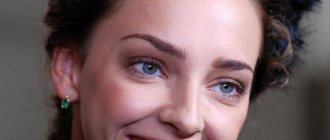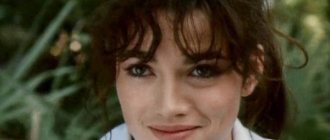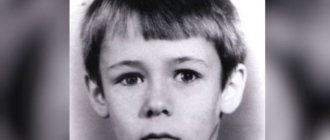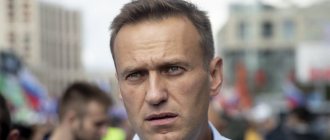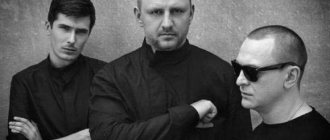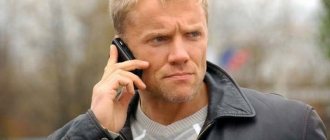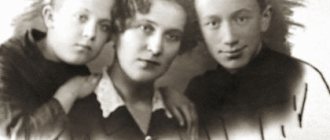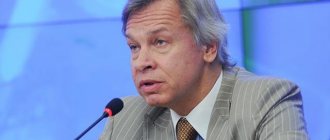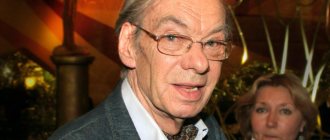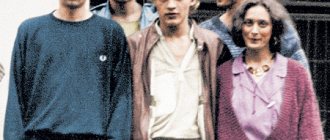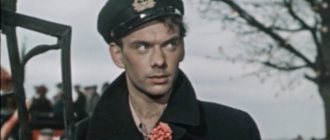Biography of Alexei Navalny
Alexey Anatolyevich Navalny is a lawyer, popular opposition blogger and public figure, founder of the Anti-Corruption Foundation, chairman of the Progress Party. Formerly a member of the board of directors. He ran for mayor of Moscow in the 2013 elections and took second place.
Russian opposition figure Alexei Navalny
Navalny's main activities are aimed at combating corruption. Among the most high-profile investigations of FBK Navalny and his team are the case of Igor Chaika (son of Prosecutor General Yuri Chaika), Vladimir Yakunin’s “fur storage facility,” Dmitry Peskov’s watch, Vladimir Pekhtin’s real estate, Sergei Shoigu’s mansion, Igor Shuvalov’s plane and “tsar-apartment,” “secret Empire" by Dmitry Medvedev. Navalny also actively advocated for ratification in Russia of Article 20 of the UN Convention, which provides for punishment for the illegal enrichment of officials.
In 2013, Navalny was found guilty in the “Kirovles case”, but three years later the European Court of Human Rights recognized the case as politically fabricated and sent the verdict for review, but the court again returned a guilty verdict.
In December 2020, Navalny announced his intention to take part in the 2020 presidential elections.
Alexei Navalny's daughter in the photo with her father
Alexey Navalny, given the type of his activity, did not actively advertise his family on the Internet. Harsh criticism of the authorities, revelations, investigations and incrimination of politicians and businessmen in corruption schemes put Alexei himself and his family in a very dangerous position. However, even despite such a strong opposition political position, Navalny’s family has long managed to appear in photographs and be published on the Internet. This is how the public learned about his teenage daughter Dasha Navalnaya.
The most popular photo, in which the future blogger Daria Navalnaya was seen, was published from the courtroom. Which, however, is not surprising, given the number of Navalny’s arrests per year. However, this particular famous photo was taken not during the arrest, but during the release of Alexei’s brother, Oleg Navalny. The photograph shows Daria Navalnaya joyfully hugging and kissing her uncle, who was finally released from prison. Alexey Navalny himself is depicted nearby in the photograph, who brought his minor daughter to court to meet with her uncle. The persistent characters of the Navalny brothers and their media footprint in the minds of young people ultimately inspired Dasha so much that on October 10, 2020, she eventually decided to open her own video blog on youth topics.
Childhood. Education
Alexei Navalny was born in the military town of Butyn near Moscow. His father, Anatoly Navalny, a native of the Chernobyl region, graduated from the Kiev Military School, after which he was assigned to Moscow. Mom, Lyudmila Ivanovna, grew up in a village near Zelenograd, graduated from the State University of Education, worked as a laboratory assistant at a research institute that produced microelectronics, and later worked at a woodworking factory.
Alexey Navalny in childhood and now
In 1993, Navalny’s parents opened a wicker weaving workshop in the Odintsovo district of the Moscow region on the basis of a bankrupt factory, where Lyudmila Navalnaya had previously worked.
In 1994, the young man graduated from the Alabino school in the village of Kalininets near Moscow and entered the law faculty of the Peoples' Friendship University of Russia, missing one point for admission to Moscow State University. In 1999, he became a student at the Financial Academy under the Russian Government, studied at the Faculty of Finance and Credit, and in 2001 received a diploma in the specialty “Securities and Exchange Business.”
Alexei Navalny with his mother, aunt and brother
Much later, in 2010, he became a fellow of Yale University's Yale World Fellows program. Every year, the university selects about 15 gifted people, mostly from third world countries, and invites them to Yale for six months to study the global problems of our society.
Studies
In 1993, Alexey received a certificate after graduating from high school in the village of Kalininets. That same summer he became a student at the Peoples' Friendship University of Russia. Initially I planned to get an education at Moscow State University, but I missed one point in the entrance exams to this educational institution. In 1998 he graduated with a law degree.
The following year, 1999, he continued to study at the Financial Academy under the Government of the Russian Federation, choosing the Faculty of Finance and Credit. In 2001, he received a diploma in securities and exchange business.
When Alexei was already over thirty, he completed a six-month course at Yale University. Every year, this educational institution, through the Yale World Fellows grant program, selects fifteen gifted people and invites them to Yale for six-month courses to study global problems of society. Navalny managed to get into this university thanks to the recommendations of venerable Russian oppositionists Evgenia Albats, Sergei Guriev and Garry Kasparov.
Social and political activities
In 2000, Alexei Navalny joined the Yabloko democratic party and was a member of the party’s Federal Political Council. Two years later, he was elected to the regional council of the capital branch of Yabloko. From 2004 to 2007, Navalny headed the apparatus of the Moscow regional branch of the party.
Alexei Navalny was a member of the Yabloko party
In 2007, Navalny was expelled from Yabloko. The reason given was “causing political damage to the party, in particular, through nationalist activities.” As Navalny himself stated, the real reason for his expulsion is the demand for the resignation of Yabloko leader Grigory Yavlinsky.
In 2004, Navalny founded the “Committee for the Protection of Muscovites,” a citywide movement that opposes corruption in urban planning and the violation of citizens’ rights. A year later, Alexey, together with like-minded people, became the founders of a new youth movement called “YES!” He also began to coordinate the “Police with the People” project.
Rally of the “Committee for the Defense of Muscovites”
Since 2006, Navalny has coordinated the “Political Debates” project and acted as chief editor of the “Fight Club” program on TVC.
In 2007, he co-founded the national democratic movement “People” along with the writer Zakhar Prilepin and Sergei Gulyaev. It was planned that “People” would subsequently join the “Other Russia” coalition, but this did not happen.
Political debate between Navalny and Lebedev In 2008, Navalny founded the organization “Union of Minority Shareholders”, which defended the rights of private investors.
Navalny took part in the nationalist “Russian March” marches. In 2008, he witnessed the brutal detention of the leader of the “Slavic Union” Dmitry Demushkin by riot police, and was ready to defend him in court.
Alexey Navalny adheres to nationalist views
In 2008, information appeared about the creation of the “Russian National Movement”, which included the organizations “Great Russia”, “People”, and DPNI. Navalny stated that the movement plans to participate in the State Duma elections. But in 2011 the movement ceased activity. Navalny’s video in support of the “People” movement In 2009, Navalny became a freelance adviser to the governor of the Kirov region, Nikita Belykh, who, as the editors of uznayvse.ru want to note, was arrested in the summer of 2020 on charges of taking a bribe.
In the summer of 2011, political science student Alburov went to the Antiseliger forum of civil and environmental activists in the Khimki forest. He knew that Navalny was speaking there, and wanted to ask to be his assistant. But a crowd of fans lined up to the new idol of the opposition, like a rock star. Only in the evening Alburov squeezed his way to him and reminded him that it was he who wrote the script that helped study how the pro-Kremlin movement “Nashi” increased the ratings of posts in LiveJournal. Navalny then retweeted a link to his post. The idol remembered, said hello and left, not suspecting that he had found perhaps his most important manager. The next time they clashed was in the Lublin court, when tax officer Vladlen Stepanov filed a libel suit against Navalny. Alburov went to the Lublin court for an hour and a half every day with Petrovsko-Razumovskaya to broadcast live on Twitter. Navalny constantly retweeted him, readers came to Alburov. One day he approached the idol again and proposed creating an observation movement before the State Duma elections. Navalny said: “Great idea!” - but didn’t help anymore. Only a couple of days before voting day, he asked Alburov to write a guide for observers and then posted it on LiveJournal. On December 28 at 1 am, Alburov received a call from an unknown number. He was with his parents in Ufa. Navalny said: “Zhora, it was you who suggested that I create an observation movement? So let’s do it for the presidential elections.” This is how RosVybory was born, a project that coordinated tens of thousands of observers across the country. But for Alburov it was more important that he finally began working with Navalny. A few years ago, Alburov lived in Ufa and connected to the Internet via dial-up. The connection was too slow to download anything, so he learned to program out of nothing to do. He came to Moscow to study as a political scientist, learned about the websites of Novaya Gazeta and Echo of Moscow, and became a fan of the investigations of minority shareholder Navalny: “Against the background of other politicians who only published statements and created movements, he looked like the Beatles in a village orchestra. But, to be honest, his humor captivated me even more than his content.” At first, Alburov’s responsibilities were vague: he was either involved in RosVybory, the Good Truth Machine, or RosPil, or simply carried out personal assignments for Navalny. At the end of 2012, Konstantin Kalmykov from RosPil forwarded a letter to Alburov from a then-unknown plagiarism detection specialist Andrei Zayakin with the comment: “This crazy person has bothered us with his letters and is distracting us from our work. Can we switch it to you?” This episode turned out to be key in the fate of Alburov. A couple of months later, Zayakin discovered that in every country there are public real estate registries, in which you can find out what kind of real estate citizens, including Russians, own. First of all, he ran all the State Duma deputies through the Miami real estate registry, found several dozen happy owners of apartments on the Atlantic Ocean and shared this information with Alburov. Together they formalized an investigation into United Russia member Vladimir Pekhtin, showed it to Navalny and published it. It was a huge success: the word “Pehtin” hung around the top Twitter hashtags for two days. The text was read by more than 300,000 people—a record for Navalny at the time. Pekhtin first claimed that “he has virtually no real estate abroad,” then threatened legal action, and finally, a few days later, resigned. This whole process was called “pekhting” - one of Navalny’s first memes. Soon, Georgy Alburov brought Navalny a new idea: “What if we show the estates of officials not on satellite maps, but film them ourselves? All you need is a drone. Will you give me some money? Navalny was sure that this was some kind of nonsense and that nothing would work, but he allowed himself to be persuaded. The decisive argument was the price - only 24,000 rubles. At the Savelovsky market, Alburov bought an AR Drone, a GoPro camera and double-sided tape to attach the structural parts to each other. The drone’s baptism of fire took place in the village of Znamenskoye, on Rublevskoye Highway, above the dachas of Governor Vorobyov and Minister Shoigu. Alburov recalls that filming with horror: “The wind, everything is shaking, the legs of the quadcopter and the propellers are visible. Then our drone flew away somewhere, we barely caught it.” The quality of the video was such that Navalny didn’t even insert it into the post, but he realized: this could really become a feature - and asked Alburov to achieve a better picture. In 2020, FBK purchased a new DJI Phantom 4 drone for 90,000 rubles. He is affectionately called “Volodya”. It can fly 4 km without stopping at an altitude of half a kilometer from the take-off point. The most popular videos that have appeared over the past year and a half have been shot on it. In the meantime, while there were no drones, FBK documented the contents of the estates with the help of a volunteer on a paramotor. It was dangerous: a man with a huge wing and a parachute flew over the dachas of officials, filming them with a huge DSLR and not controlling the paramotor at that moment. “How come they didn’t kill us at all?” - Alburov is surprised. If the likelihood of a search at FBK increases, “Volodya” immediately goes to visit someone.
Anti-corruption activities
In May 2008, Navalny announced on his blog that, together with like-minded people, he intended to find out why oil from large Russian state-owned companies was being sold by trader Gunvor.
According to Alexey, he contacted the heads of Rosneft, Surgutneftegaz and Gazprom Neft, but received no clarification. By the way, Navalny is a minority shareholder of Rosneft, Gazpromneft, VTB. At the end of 2010, Navalny announced the creation of the RosPil project, which intended to combat abuses in public procurement. By May 2011, the project reported on the discovery of fraud in state auctions amounting to 1.6 billion rubles, and with the help of RosPil participants, fraud amounting to 337 million rubles was stopped. The project received an award from the international blog competition The BOBs as the most useful resource for society.
Navalny is often accused of collaborating with Western intelligence agencies
In 2011, Navalny registered the Anti-Corruption Foundation (FBK). Economist Sergei Guriev and entrepreneurs Vladimir Ashurkov and Boris Zimin invested in the project.
“The Party of Crooks and Thieves” – the author of this famous Internet meme is Alexey Navalny. The phrase was born on February 2, 2011 on the air of Finam FM. Soon information appeared that ordinary party members were offended and were planning to sue. In response to this, Navalny initiated a poll on his blog: “Is United Russia a party of swindlers and thieves?” 96.6% of the respondents, whose total number was 40 thousand, answered “yes”.
Navalny on the air of Fimam FM In mid-2011, Alexey Navalny launched the Internet project “RosYama” within the framework of FBK, which was supposed to encourage the Russian authorities to improve the condition of roads in the country. On the project pages, users posted pictures of damaged roads, on the basis of which the system generated complaints to the traffic police. If there was no response within the required time frame, RosYama employees sent a letter to the prosecutor’s office.
At the beginning of 2012, Navalny and his team launched the RosVybory project to monitor the presidential elections. About 17 thousand observers took part in the project.
Alexey Navalny and Boris Nemtsov
Alexei Navalny's Anti-Corruption Foundation positions itself as the only non-profit organization in Russia that investigates acts of corruption among the highest echelons of power.
The FBK has repeatedly come under the radar of the head of Russian Railways, Vladimir Yakunin, to whom the Foundation attributed the presence of a “modest” dacha near Domodedovo with an area of several tens of hectares. Most of all, Internet users were struck by a separate room given over to a “fur storage room.”
FBK discovered “Yakunin’s secret dacha”
A lot of noise was caused by Igor Shuvalov’s private plane discovered by Navalny, on which his Welsh Corgi dogs flew to exhibitions, as well as by the official’s purchase of apartments on one floor of an elite high-rise building on Kotelnicheskaya Embankment. FBK estimated the total cost of apartments in pre-renovation condition at 600 million rubles.
Navalny found Shuvalov's private jet
Navalny in the Moscow mayoral elections
Alexey Navalny nominated his candidacy for the post of mayor of Moscow in the early elections in 2013 from the RPR-Parnas party.
And about. Mayor Sergei Sobyanin commented on Navalny’s actions as follows: “To be honest, I don’t know what prospects candidate Navalny has. We did everything possible to register him so that Muscovites would have the opportunity to have a greater choice among candidates for mayor of Moscow.”
Navalny took 2nd place in the Moscow mayoral elections
However, according to the results of the popular vote, Alexey Navalny took second place with 27.24% of the votes.
Prosecutions. The Kirovles case
On December 5, 2011, that is, the day after the State Duma elections, Alexey Navalny spoke at an authorized rally on Chistoprudny Boulevard. Muscovites who came to the rally expressed disagreement with the election results and made accusations of fraud against the election commission and the United Russia party.
Alexey Navalny at a rally on Chistoprudny Boulevard
After this action, Navalny and like-minded people went to an unauthorized march to the Russian Central Election Commission, where he was detained by the police. The next day, Navalny was found guilty of resisting law enforcement officers and sentenced to 15 days of administrative arrest. Navalny was released on December 21.
On May 9, 2012, Navalny was again sentenced to arrest for 15 days. This time – for participation in an illegal public event on Kudrinskaya Square, the so-called People’s festivities,” which became a mass sign of protest against the dispersal of the “March of Millions” that took place earlier, on May 6. The march participants were unhappy with the fact of Vladimir Putin's inauguration. Navalny appealed this detention and arrest to the European Court of Human Rights.
Photo from the “March of Millions” (05/6/2012)
In May 2011, a criminal case was opened against Alexei Navalny under Art. 165 of the Criminal Code of the Russian Federation – “causing property damage by deception or abuse of trust.” The point was that Navalny and businessman Pyotr Ofitserov, the owner of the Vyatka Forestry Company, allegedly misled the director of the State Unitary Enterprise Kirovles, Vyacheslav Opalev, as a result of which he signed a contract unfavorable for his enterprise and suffered damage of 16 million rubles.
Navalny denied guilt, citing bias in the case, since shortly before this he had presented information on cuttings at Transneft on his blog, and also accused Opalev of “creating completely unthinkable schemes” for the sale of timber. According to Navalny, he achieved the dismissal of Opalev and a full audit of Kirovles, which was the reason for initiating the case.
Navalny: “The Truth about Russia, Power and Putin”, 2011 After the proceedings, the case was dismissed on April 10, 2012. The reason is the lack of evidence of a crime. It was later resumed by order of the leaders of the Investigative Committee. However, on May 29 of the same year, the order to terminate the case was canceled.
The case came back to court in April 2013. The testimony of prosecution witnesses indicated that the cooperation of Kirovles with VLK was unprofitable for the former. However, VLK’s partners testified that the timber was shipped to them at market prices, and they have no complaints against both defendants in the case. The governor of the Kirov region, Belykh, who spoke at the trial, also stated that the activities of VLK did not harm the region.
On July 18, 2013, Navalny was sentenced to five years in prison and a fine (500 thousand rubles), Ofitserov was sentenced to four years in prison and a similar fine. The sentence was carried out during Navalny's election campaign for the mayoral elections.
Navalny was found guilty in the Kirovles case
During the appeal hearing that took place the next day, Navalny and Ofitserov were released on their own recognizance. During further consideration, violations were discovered when making a guilty decision, and the real terms were replaced with suspended sentences while maintaining the fine. Alexey Navalny appealed to the ECHR, which in February 2020 confirmed the violation of the rights of the accused in the Kirovles case, but did not recognize the case as politically motivated, as Navalny and Ofitserov’s lawyers insisted. The Kirovles case: Navalny’s last word At the end of 2020, the court again began considering the Kirovles case. The new sentence, according to Navalny, repeated the previous one verbatim. The defendants were again sentenced to 4 and 5 years probation. On the same day, the ECHR condemned the verdict, calling the goal of the entire process to exclude Navalny from the country’s political process.
Alexey Navalny - statuses
the opportunity to destroy the old society and build anew, then such darkness, such chaos will emerge, something so crude, blind and inhuman that the entire building will collapse under the curses of humanity... Once having rejected Christ, the human mind can achieve amazing results.
Europe rejects Christ, but we, as you know, are obliged to imitate Europe.” 3. “Our entire liberal party passed by the matter without participating in it. She just denied and giggled.” It’s good to laugh within the walls of a strong state that you didn’t build, “no, you’re being liberal when it’s not profitable, I wish I could look at you.”
4. “How will you unite people to achieve your civic goals if you do not have a moral basis? Try to unite people into civil society with the sole purpose of “saving our bellies”? Nothing will work out. “Saving bellies” is the most powerless and last idea of all the ideas that unite humanity. This is already the beginning of the end."
5. “One of the characteristic features of Russian liberalism is a terrible contempt for the people. The Russian people will never be forgiven for wanting to be themselves. All the traits of the people were ridiculed and put to shame: faith, meekness, submission to the will of God. For liberals, the Russian people are “an inert mass, dumb and deaf, dedicated to paying taxes and supporting the intelligentsia.”
6. “Our Russian liberal is first and foremost a lackey and is only looking to clean someone’s boots.”
7. “Yes, you will represent the interests of your society, but certainly not the people. Secure him again! Not only will it be impossible to speak against you, but even to breathe a seal in front of you.”
8. “Westernism is a party ready to fight against the people. She has become over the people as a guardian intelligentsia; she denies the people. She abhors the idea of solidarity between the people and the Tsar. A Russian who has become a real European cannot help but become at the same time a natural enemy of Russia.”
9. “Herzen denied property and was wealthy. He started revolutions and loved comfort. Our “wanderers” sold peasants and, having received the money, went to Paris to promote the publication of radical newspapers. Who stopped them from simply freeing their peasants?”
10. “According to my numerous observations, our liberal is never able to allow someone to have his own special conviction and not immediately respond to his opponent with a curse or even something worse.”
11. “Liberalism is not a sin; it is a necessary component of the whole, which without it will disintegrate or die; liberalism has the same right to exist as the most well-behaved conservatism; but I attack Russian liberalism, and again I repeat that, in fact, I attack it because a Russian liberal is not a Russian liberal, but is not a Russian liberal. Give me a Russian liberal, and I’ll kiss him right now in front of you.”
12. “Liberals, instead of becoming freer, tied themselves to liberalism like ropes. And when it is necessary to express a free opinion, they tremble first of all: will it be liberal? And sometimes they throw out such liberalisms that even the most terrible despotism and violence cannot be imagined.”
13. “The Russian liberal has reached the point where he denies Russia itself, that is, he hates and beats his mother. Every unfortunate and unfortunate Russian fact excites laughter and almost delight in him. He hates folk customs, Russian history, everything. If there is an excuse for him, it is that he does not understand what he is doing, and mistakes his hatred of Russia for the most fruitful liberalism.”
14. “Not so long ago, some of our liberals took this hatred of Russia almost for true love for the fatherland and boasted that they saw better than others what it should consist of; but now they have become more frank and even the words “love of the fatherland” began to be ashamed, even the concept was expelled and eliminated as harmful and insignificant.”
15. “There cannot be such a liberal anywhere who would hate his own fatherland. How can we explain all this? By the same token as before—by the fact that a Russian liberal is not yet a Russian liberal; nothing more, in my opinion.”
#Alexey Navalny #Ksenia Sobchak #Vasily Utkin #Yuri Dud #Politics #Sports.ru
Alexey Navalny 2020
In December 2020, Navalny announced that he intended to take part in the 2020 presidential elections, thereby launching his election campaign, during which he, together with like-minded people, opened a number of election headquarters in the largest cities of Russia. Alexei Navalny aims to run for president In March 2020, the Foundation posted on YouTube a 50-minute film “He’s Not Dimon”, which was an investigation into a “multi-level corruption scheme” with the participation of Dmitry Medvedev. Three weeks later, rallies of thousands took place across Russia, with participants demanding answers from Medvedev about the information contained in the video. “He’s not your Dimon” On March 26, during an unauthorized rally on Tverskaya Street, Alexei Navalny was detained by law enforcement agencies. He was given a fine (20 thousand rubles) for organizing an unauthorized rally, and was also given 15 days of administrative arrest for “resisting the lawful demands of a police officer.”
Alexei Navalny in court after the rally on Tverskaya
On June 12, Russia was swept by a second wave of opposition rallies. This time, Alexey did not have time to leave the entrance when he was detained by the police. The Simonovsky District Court of Moscow arrested him for 30 days, accusing him of multiple violations of the rules for holding rallies: on the evening of June 11, he called on supporters to go to an unauthorized procession on Tverskaya Street, where a festival of re-enactors was taking place at that time, instead of the agreed rally on Sakharov Avenue. In total, more than 800 people were detained during the opposition rally in Moscow.
As part of the election campaign, the politician held a number of large-scale rallies in Russian cities.
Alexei Navalny addresses voters
The Central Electoral Commission refused to register Navalny for the presidential election due to his criminal record in the Kirovles case, despite the decision of the ECHR recognizing him as politically engaged. After this, Alexey called for a boycott of the elections and named the date of the all-Russian voter strike - January 28. How Mikhail Prokhorov bought a villa from Alexander Khloponin For the action against the inauguration of Vladimir Putin “He is not your king” (held on May 5, 2018), ten days later, Navalny was arrested for 30 days. The election campaign ended, and FBK returned to its main activities: it caught Mikhail Prokhorov in bribing Deputy Prime Minister Alexander Khloponin, found a Parisian apartment from propagandist Aram Gabrelyanov for 2 million euros, etc.
Childhood and youth
Navalny Alexey Anatolyevich was born on June 4, 1976 in the military town of Butyn, located in the Moscow region. His parents are Anatoly Ivanovich and Lyudmila Ivanovna.
Alexei Navalny as a child, with his family.
The first school years of the future presidential candidate (34 years ago) Published by Andrey Antsyborov Thursday, December 6, 2020
Alexey Navalny in childhood with his parents and brother
At the time of democratic changes, they managed to become businessmen, owners of the Kobyakovsky wicker weaving factory. Alexey does not directly talk about his nationality, but in an interview he noted that his ancestry is closely connected with Ukraine.
6 stars who traded their profession for the political platform
After graduating from school, Navalny entered the Peoples' Friendship University of Russia at the Faculty of Law. In 1998, he continued his studies at the Financial Academy under the Government of the Russian Federation. At the same time, the young man worked as a lawyer at Aeroflot Bank and the development company ST Group.
Having received a diploma in financier, Navalny did not stop there and supplemented his education with a 6-month course of study at Yale University under the Yale World Fellows grant program, where he managed to get on the recommendations of Garry Kasparov, Sergei Guriev and Evgenia Albats.
Personal life of Alexei Navalny
Alexei Navalny is married. The oppositionist's wife's name is Yulia, her maiden name is Abrosimova. They met in 1999 at a resort in Turkey. The couple has two children: daughter Daria (born in 2001) and son Zakhar (born in 2008).
Wedding photo of Alexei and Yulia Navalny
For a long time, the couple lived in a small apartment in one of the panel houses on Lyublinskaya Street, Maryino. However, at the end of 2016, the oppositionist announced that he was looking for housing to rent, as his grown-up children began to feel cramped living in one room.
Navalny with his wife and children
Children of Alexei Navalny
The children of Alexei Navalny are daughter Daria, born in 2001, son Zakhar, born in 2008. Daria Navalnaya has already graduated from school this year and is going to enter university. Son Zakhar Navalny is still studying at school. It is interesting that the children of Alexei Navalny are more like his wife, but they have little in common with their father.
Alexei Navalny often spends his free time with his family. On social networks, the public figure is happy to share recent photographs of his wife and children. Most often, these photos are from joint dinners in various establishments.
Alexey Navalny now
In August 2020, FBK posted a video investigation involving State Duma Speaker Vyacheslav Volodin and his 82-year-old mother Lidiya Barabanova, a former school teacher. The oppositionist cited evidence that the woman owned an apartment worth more than 200 million rubles, as well as several businesses, one of which was registered quite recently. Navalny’s team argued that Barabanova was a front person for registering companies, and that their true owner was her son. The video caused a wide resonance, given that a few days earlier Volodin publicly predicted the complete abolition of pensions in the absence of pension reforms and advised the people gathered in the hall to play more sports in order to live up to retirement age. FBK: Apartment and business of Vyacheslav Volodin’s mother
